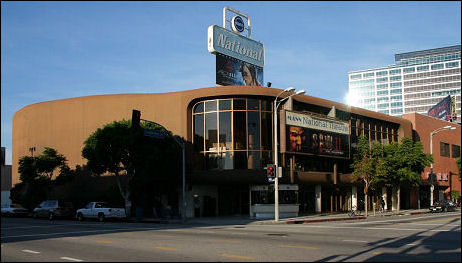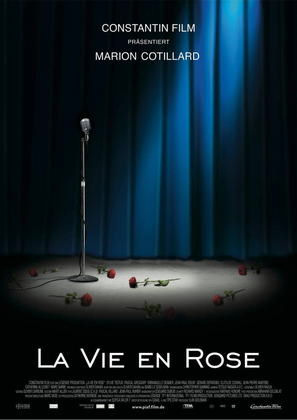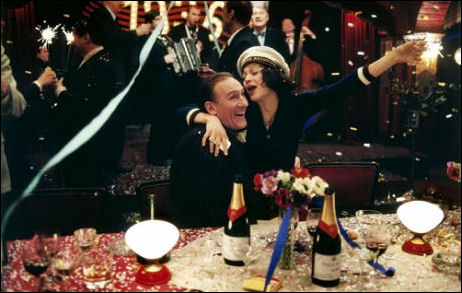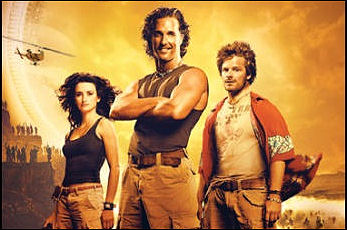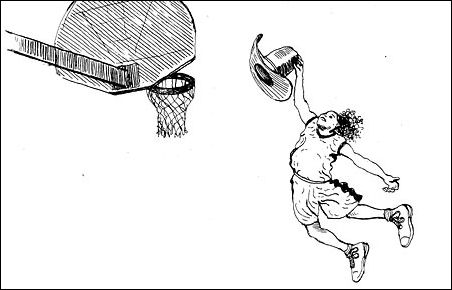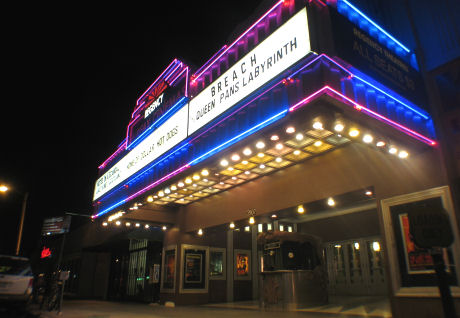As biopics about self-destructive artists go, Oliver Dahan‘s La Vie en Rose — the sad story of French songbird Edith Piaf — is above-average. It screams “passion” from every pore, and delivers in the way a movie like this should — superb period atmosphere (World War I to early 1960s), handsome production values, fine ensemble acting, skillful editing and, for a film about a very intense and event-filled life, appropriately longish (140 minutes). But it is essential viewing for one reason and one reason only — Marion Cotillard‘s bracingly vivid, wholly convincing, almost mind-blowingly hardcore performance as Piaf.


Marion Cotillard in
A Good Year; as Edith Piaf in
La Vie en RoseA large-eyed, dark-haired hottie last seen in Ridley Scott‘s A Good Year, the 31 year-old Cotillard so physically resembles the diminutive Piaf — a frail, sparrow-like woman who stood only 4 foot seven inches — and so burrows inside this legendary singer’s aura of hurt in nearly every stage of her life that she blows you away in almost every scene. I’m making it sound like an overbearing performance but it’s not, trust me.
Matthew Smith‘s prosthetic makeup is certainly part of the effect, but Cotillard’s performance would be nothing without her capturing Piaf’s spiritual essence (or at least, what I’ve always believed that spiritual essence amounted to) . The result is one of those amazing-transformation, De Niro-as-Jake La Motta performan- ces that automatically gets Oscar attention. 2007 isn’t quite one-third gone, but there’s no way in hell Cotillard won’t be Best Actress-nominated.
La Vie en Rose (called La Mome in France) won’t open in this country until June 8. (Bob Berney‘s Picturehouse is distributing.) Nonetheless, the L.A. press junket happens tomorrow and its L.A. premiere tomorrow night.
Dahan, who co-wrote the script with Isabelle Sobelman, adopts a here-and-there, back-and-forth approach to Piaf’s relatively brief life (1915 to 1963), which didn’t quite span 48 years. He takes paintbrush stabs at her life with a kind of mosaic- pointillist technique.
There’s no way to deliver the kind of upbeat-ending finales that Ray and Walk The Line had when your subject winds up dead from morphine addiction and other lifelong abuses (and looking like death itself at the end), but the spirit of this enterprise is so fierce and trembling that using the word “downer” would be grossly off-the-mark.
I could pass along the plot particulars and describe the numerous secondary characters and raise a glass to each and every performer, but I’m not going to. Everything significant in Piaf’s Wikipedia biography has been rendered on the screen, and if you want to know the story before seeing the film, go for it.
Suffice that all the performances have a finely rendered, steeped-in-conviction quality. Gerard Depardieu‘s Louis Leplee, the Parisian nightclub owner who discovered Piaf, and Jean-Pierre Marin‘s Marcel Cerdan, the great love of Piaf’s life, are the best of the lot.
I was also taken with Catherine Allegret‘s performance as Louise, a Normandy brothel-runner who helped raise Piaf as a very young girl. (My first thought was how much Allegret resembles Simone Signoret; it was quite a mind-bender to read that she’s her daughter.)
Here’s a video clip of a scratchy old concert film clip of Piaf in the late 1950s. And here’s another one.
“La vie en rose” (i.e., “life through rose-colored glasses”) is said to be Piaf’s signature song, although I’ve always thought that “Non, je ne regrette rien” was a much fuller, on-target summation of who she was and how she dealt with the ups and downs.
Picturehouse acquired U.S . distrib rights o La Vie in Rose in Cannes last year, and will be pushing it for Best Foreign Language Feature, no question.
Cotillard “delivers one of the best female performance of the past decade,” a guy who wrote me from the Berlin Film Festival insisted last February. “She’s the Penelope Cruz-in-Volver of this calendar year, except she could have a serious shot at winning.” I don’t agree. At this stage of the game, Cotiilard seems like this year’s Helen Mirren. Is that overstating things? I’m not so sure that it is.
It’s not in the least bit significant that Cotillard is 5′ 6 and 1/2 inches, or nearly a full foot taller than Piaf, since almost no one watching this film is likely to know this or be aware of any height discrepancy anyway. But it is significant that everything she says and does as Piaf is a complete immersion, an exceptional revisiting…an absolute knockout.


